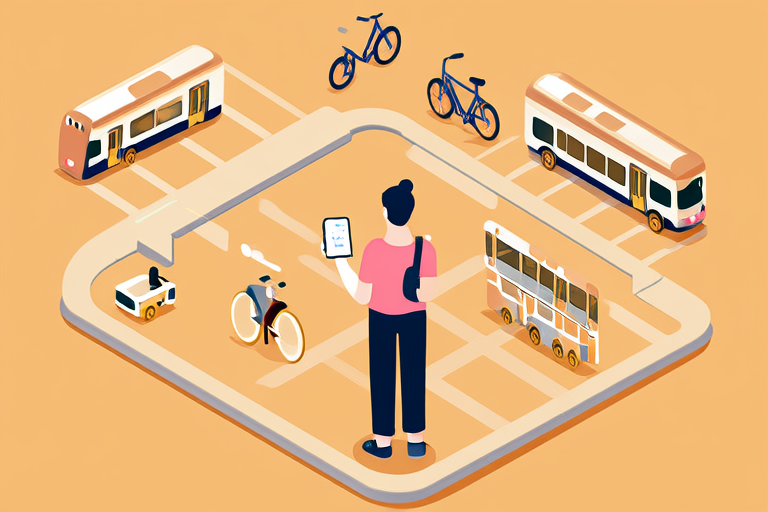Top 10 Essential Transportation Tips for Efficient Travel Planning
Introduction: Why Efficient Travel Planning Matters
Traveling is an exciting adventure, but the planning process can sometimes feel overwhelming. Whether you’re heading to a new city or exploring your own backyard, efficient transportation planning is key to ensuring a smooth and enjoyable trip. From saving time to reducing stress, effective travel arrangements can make all the difference in your overall experience. In this article, we’ll explore ten essential tips that will help you plan your transportation with ease and confidence.
1. Research Multiple Modes of Transportation
One of the first steps in efficient travel planning is researching various modes of transportation available at your destination. While airplanes are often the go-to option for long distances, they may not always be the most convenient or cost-effective choice. Consider alternatives like trains, buses, or even car rentals, depending on your specific needs and preferences.
Key Points:
- Airports vs. Train Stations: Airports are generally more accessible but may require longer commute times from city centers. Train stations, on the other hand, are often located closer to downtown areas.
- Buses and Trains: Public transit options like buses and trains can offer flexible schedules and lower costs, making them ideal for budget-conscious travelers.
- Car Rentals: If you prefer the freedom of driving yourself, renting a car can be a great option. However, consider factors such as parking fees, fuel costs, and potential traffic congestion.
2. Utilize Online Booking Platforms
In today’s digital age, online booking platforms have made it easier than ever to compare prices and book transportation services. Websites like Skyscanner, Google Flights, and Expedia allow you to search for flights, train tickets, and rental cars all in one place. These platforms also provide valuable information about departure times, arrival locations, and even user reviews.
Key Points:
- Price Comparison Tools: Use tools like Skyscanner to compare prices across multiple airlines and travel agencies.
- Flexible Dates: Many booking sites offer filters for flexible dates, helping you find the cheapest fares within your preferred travel window.
- User Reviews: Read reviews from other travelers to gain insights into potential issues with specific airlines or transportation providers.
3. Plan Your Itinerary Around Transportation Times
Once you’ve selected your mode of transportation, it’s important to plan your itinerary around the schedule. This includes considering layovers, transfer times, and local public transit options. By doing so, you can avoid unnecessary delays and ensure that you arrive at your destination on time.
Key Points:
- Layover Management: If you have a connecting flight, allow extra time for security checks and boarding procedures.
- Transfer Time: Factor in additional time for transfers between airports or train stations, especially during peak hours.
- Local Transit Schedules: Familiarize yourself with local bus and train schedules to minimize wait times and maximize efficiency.
4. Pack Light and Prioritize Essentials
While packing light might seem unrelated to transportation, it plays a crucial role in efficient travel planning. Excess baggage can lead to higher fees, longer check-in times, and increased stress. Instead, focus on bringing only the essentials and consider using carry-on luggage whenever possible.
Key Points:
- Lightweight Clothing: Choose lightweight, versatile clothing that can be easily layered.
- Travel-Sized Products: Opt for travel-sized toiletries and electronics to reduce weight.
- Digital Documents: Store important documents like boarding passes and itineraries on your phone or tablet to avoid carrying physical copies.
5. Stay Informed About Local Traffic Conditions
Traffic conditions can significantly impact your travel plans, especially if you’re driving or relying on public transit. To stay informed, use real-time traffic apps like Waze or Google Maps to monitor road conditions and adjust your route accordingly. Additionally, consider alternative routes or modes of transportation if traffic congestion becomes too severe.
Key Points:
- Real-Time Updates: Use apps like Waze to receive real-time updates on traffic conditions and accidents.
- Alternative Routes: Be prepared to take alternative routes if traffic congestion becomes too heavy.
- Public Transit Options: Consider switching to public transit during peak traffic hours to avoid delays.
Practical Case Study: Efficient Transportation Planning for a Weekend Getaway
Let’s imagine you’re planning a weekend getaway to a nearby city. Here’s how you can apply these tips to ensure a seamless travel experience:
- Research Transportation Options: Look into both air and ground transportation options. For example, if you’re traveling to New York City, consider taking a direct flight or opting for a high-speed train.
- Book in Advance: Use an online booking platform to compare prices and book your tickets well in advance. This will give you access to the best deals and ensure availability.
- Plan Your Itinerary: Once your transportation is booked, plan your activities around the schedule. Allow ample time for transfers and layovers to avoid rushing.
- Pack Light: Stick to essentials and consider using carry-on luggage to save time at the airport.
- Stay Informed: Keep an eye on local traffic conditions and be prepared to adjust your plans if necessary.
Conclusion: Take Action Today!
Efficient travel planning requires careful consideration of transportation options, booking strategies, and itinerary management. By following these ten essential tips, you can streamline your travel arrangements and enjoy a smoother, more stress-free journey. Remember, preparation is key—so start planning early and stay organized throughout the process. Happy travels!
